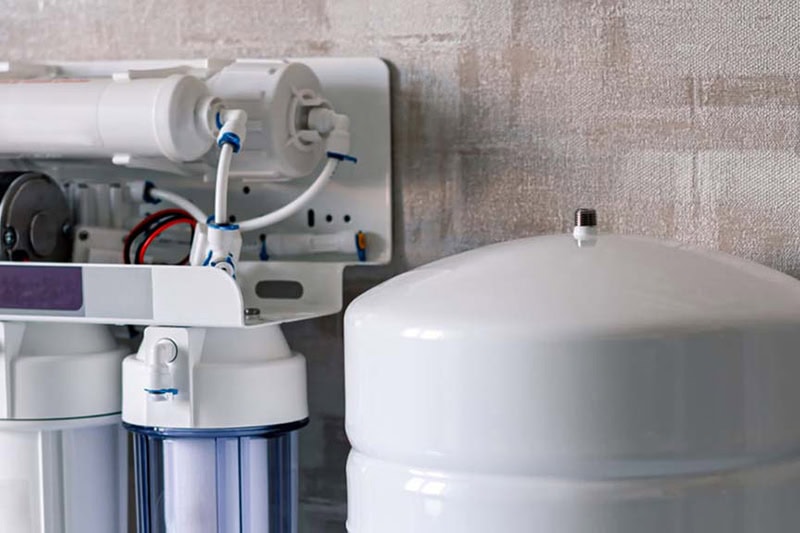Protect Your Ladue Drinking Water From ‘Forever Chemicals’

Is your drinking water safe? You may assume it is because your local water treatment center is clearing it. But without a whole-home water filtration system, your water may contain harmful particles such as polyfluoroalkyl substances (PFAS).
Even if your Missouri home receives water from a private well, PFAS contamination is everywhere—even infiltrating your groundwater.
Tony LaMartina Plumbing is committed to bringing you the most up-to-date information on safe drinking water and ensuring you and your family are protected against the contaminants that could be present in your Ladue home’s water.
Our water filters can help lessen your exposure to chemicals like PFAS and other drinking water concerns, such as microplastics and high levels of minerals or other chemicals.
What are Polyfluoroalkyl Substances (PFAS)?
Polyfluoroalkyl substances (PFAS) are commonly called “forever chemicals” because they take thousands of years to break down. It is a label given to over 15,000 types of chemicals that are oil, water, and heat resistant.
Originally manufactured in the 1940s to combat stains and sticking, PFAS chemicals are present today in everyday products like:
- Waterproof fabrics (e.g., raincoats, umbrellas, tents, etc.)
- Non-sticking cookware
- Cleaning products
- Personal care products (e.g., shampoos, makeup, dental floss, nail polish, etc.)
- Stain-resistant coatings
Polyfluoroalkyl substances were once used in food packaging (e.g., fast food wrappers, take-out boxes, popcorn bags, etc.), but this practice started phasing out in 2020 with voluntary action by national food manufacturers in coordination with the US Food and Drug Administration (FDA).
The FDA recently announced in February 2024 that materials made with PFAS were no longer being sold for use in food packaging products within the United States.
2024 EPA PFAS Drinking Water Regulation
On April 10, 2024, The US Environmental Protection Agency (EPA) announced the first-ever national regulation against “forever chemicals” in drinking water.
Public utility treatment centers will now be required to test for six types of PFAS, though, as previously mentioned, there are over 15,000 of these chemicals.
While the EPA has stated there is no safe exposure level to polyfluoroalkyl substances (PFAS), the new standard for Maximum Contaminant Levels (MCLs) is 4.0 parts per trillion. To get an idea of how much that is, one part per trillion is like a drop of water taken from the totality of 20 Olympic-sized pools.
Water treatment centers will have three years to complete their initial testing, and any findings over the maximum of 4 parts per trillion must be released to the public. Water contamination reports are usually available upon request and are typically provided to homeowners annually.
Should water treatment centers identify PFAS levels over the new MCL standard, the EPA states they have five years to implement necessary solutions to reduce the PFAS in the drinking water.
Dangers of Polyfluoroalkyl Substances (PFAS)
Many plastic and synthetic products manufactured with PFAS do not break down like organic products. Instead, discarded products sit around in landfills, pollute water sources, or litter parks and nature, releasing both microplastic particles and PFAS chemicals into the air, ground, and water.
According to the EPA, some of the common health concerns stemming from the exposure to PFAS in our environment include:
- Several types of cancers, such as bladder, kidney, liver, and prostate cancer
- Kidney, cardiovascular, and thyroid disease
- Elevated cholesterol levels and increased risk of obesity
- Reduced immune responses and hormonal imbalances
- Reproductive complications such as prenatal hypertension and decreased fertility
- Developmental effects in children such as low birth weight, neurodevelopment delays, bone variations, and accelerated puberty
What If My Water Comes From a Private Well?
With the new announcement, the EPA is providing $1 billion in funding to go toward the Bipartisan Infrastructure Law, which helps states and territories work towards implementing these new changes in public water systems and assist owners of private wells to address any polyfluoroalkyl substances (PFAS) contamination.
Act Now for Safe Drinking Water
With the potential wait of nearly a decade to pass before appropriately lowering the levels of polyfluoroalkyl substances (PFAS) in your drinking water, acting now by implementing a whole-home water filtration system at your Ladue home can begin improving the quality and safety of your drinking water immediately.
As dangerous as PFAS particles are to your health, they are not impervious to removal. In-home water filtration systems, particularly those that are carbon-activated or reverse osmosis, are ideal product options for the removal of PFAS from your home’s drinking water.
Carbon-activated water filtration systems utilize a porous material that attracts and traps chemicals and other impurities from the water as it passes through.
Reverse osmosis water filters connect under your kitchen sink and filter water through a membrane that has pores as small as 0.0001 microns to filter out contaminants.
Dual-stage water filters with both activated carbon and reverse osmosis features can also provide similar results. These systems implement a combination of the above-described processes.
As with any system, proper maintenance will also contribute towards more effective PFAS removal, so be sure to follow all recommended care for your whole-home water filtration system.
Contact Us Today
Tony LaMartina Plumbing has been helping Ladue, MO, homeowners achieve clean, fresh drinking water for decades. Call us at 314-686-7752 or request service online to discuss how our water filtration systems can help remove polyfluoroalkyl substances (PFAS) and other unwanted contaminants from your drinking water.
